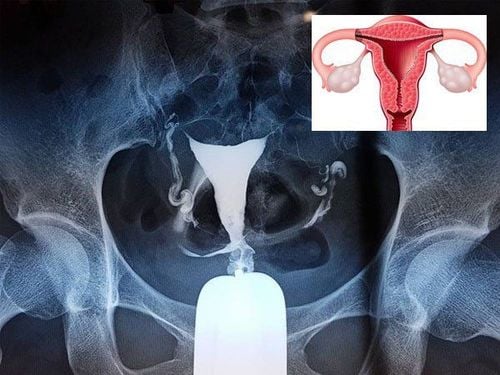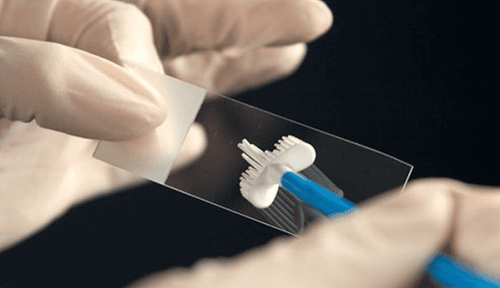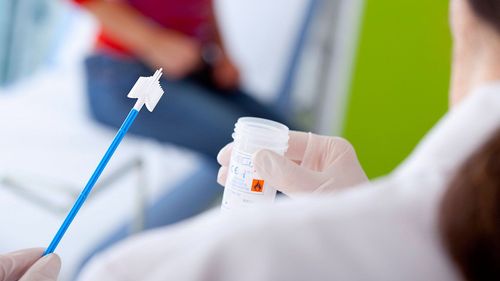This is an automatically translated article.
The article was professionally consulted by Specialist Doctor II Pham Thi Tuyet Mai - Obstetrician and Gynecologist - Department of Obstetrics and Gynecology - Vinmec Hai Phong International General Hospital.Gynecological examination is very necessary for women, especially those of reproductive age. When having the first gynecological examination, many people have anxiety. However, the examination process is simple, quick and painless.
1. When should the first gynecological examination?
Women should start having their first gynecological exam between the ages of 13 and 15. In fact, many women often feel anxious before deciding to see a gynecologist for the first time in their life.That's normal. If possible, you should discuss with family members, parents because this will help bring a more comfortable feeling. During the exam, you can also express your concerns to let the doctor know and try to reassure you.
2. How is the first gynecological examination performed?
Your first gynecological exam is simply a conversation between you and your doctor. However, your doctor may also order you to have certain tests done.During your visit, your doctor will often ask a lot of questions about yourself and your family. Some of them may be related to a personal issue, such as your menstrual cycle or sexual habits (including vaginal, oral, or anal sex). If you are concerned about the security of your information, talk to your doctor frankly before answering any questions to make sure the information is kept confidential.

3. Tests performed during gynecological examination
Sometimes you have to do some clinical tests on your first gynecological visit . If you are concerned, you can ask family members to be involved in the process. Usually, your doctor will perform:General physical examination: This includes measuring your height, weight, blood pressure and checking for any health problems you may have. External genital exam: The doctor will look at the vulva and identify any abnormalities, if any. You may be given a mirror to look directly at your vulva. This is a good opportunity to learn about your own body and the names of each detail on your genitals. Usually, you don't need to have a pelvic exam during your first pelvic exam unless you have an unusual problem, such as unusual bleeding or pain. If you have been sexually active, tests for certain STIs will be needed. Most tests that are done on a teen's teen will require a urine sample. In addition, your doctor may also recommend certain vaccines.
4. Pelvic Exam and Pap Test
Most first-time gynecological exams don't require a pelvic exam, but it's still a good idea to know what it is. Another test you will have to have later (at age 21) is the Pap test. This test checks for abnormal changes in the cervix that could lead to cancer.Pelvic examination is divided into three steps:
View of the vulva Observation of the vagina and cervix with the help of a speculum (a medical instrument that widens the vagina so the doctor can see internal examination and examination) Inspecting internal organs with gloves When you have a Pap test, the steps are similar, but your doctor will have to use a small brush to remove a sample of cells. cells from the cervix for testing.
To examine internal organs, the doctor will put on a glove, lubricate the tip of one or two fingers and insert it into the vagina, up to the cervix. Otherwise, the doctor will press on the abdomen from the outside. This is done to check for abnormalities in the cervical area.

5. Get vaccinated against disease
Vaccination is a necessary procedure for everyone, especially children when they are old enough, to protect the body against certain infections. The following basic vaccines are given to all young women 11 - 18 years of age:Tetanus, diphtheria, and pertussis vaccine (HPV (Human papillomavirus vaccine) vaccine) Brain Influenza vaccine (annual shot) In addition to the routine vaccines listed above, the following special vaccines may be given to young women at high risk for certain diseases: management, including:
Hepatitis A vaccine Pneumococcal vaccine
6. What should be discussed during the first gynecological visit?
Girls before and during puberty need to care and actively learn and consult with their doctors about important health issues. Issues that should be discussed directly with the doctor during the first gynecological visit include:Cramps and menstrual cycle problems Acne Sexual weight and gender Prevention pregnancy Sexually transmitted diseases Alcohol, drugs and tobacco The ability to control emotions
7. Routine gynecological examination how often?
Periodic gynecological examination will help detect diseases related to reproductive organs in women early for timely detection and treatment, especially cancer at an early stage. The time of treatment often has a great influence on the results of treatment, so women should form a habit of periodic gynecological examination every 6 months or 1 year to prevent disease problems and ensure fertility. as well as general health are at their best.8. Prestigious gynecological examination address in Hanoi

With a system of modern equipment along with a team of highly specialized, experienced doctors, many years of gynecological examination, when performing the basic gynecological examination and screening package at the Hospital Vinmec International General Hospital, customers will receive:
Gynecological examination Gynecological ultrasound transvaginal ultrasound of the uterus and ovaries Transvaginal ultrasound of the breast on both sides Perform tests such as: Treponema pallidum rapid test, Chlamydia rapid test, taking samples for cervical-vaginal cytology, endoscopic staining bacteria (female vaginal fluid), HPV genotype PCR automated system, Urinalysis by automatic machine. The basic gynecological examination and screening package helps customers detect inflammatory diseases early, so that they can be treated easily and inexpensively. Besides, you are also screened for early detection of gynecological cancer (cervical cancer) for timely treatment when there is a risk of disease.
Please dial HOTLINE for more information or register for an appointment HERE. Download MyVinmec app to make appointments faster and to manage your bookings easily.
Reference source: Acog.org













